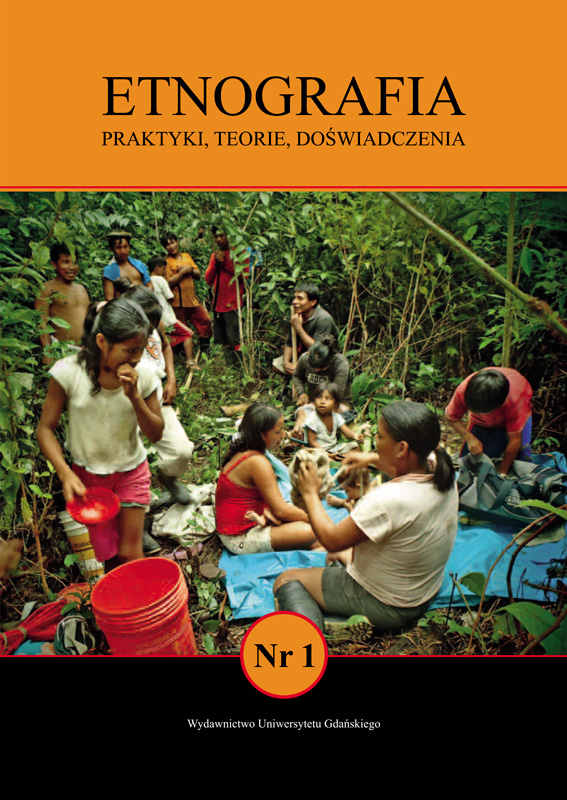Drunken speech: A glimpse into the backstage of sociality in Western Amazonia
DOI:
https://doi.org/10.4467/254395379EPT.15.001.6466Słowa kluczowe:
conviviality, descent, alterity, Peru, Panoan, Western AmazoniaAbstrakt
This paper engages notions on sociality by Spanish speaking descendants of Panoan Capanahua from Peru, as revealed in one aspect of social practice. Speaking while inebriated, members of this small Western Amazonian population draw from locally specifi c set of ideas about the nature of social life. Therefore, an overview of various standardized themes and attitudes or modalities of such speeches presented in this paper refl ects different, often confl icting layers of ideas and practice of social life. Because of both their content and notions about the very inebriation, drunken speeches are shown to offer a privileged vantage point for understanding the Capanahua descendants’ notions and realizations of sociality. Indeed, they reveal one of the important problems fuelling the dynamics of their sociality, which is the tension between, on the one hand, perceptible dimension of village sociality governed by ideals of equality and neighbourly conviviality, and on the other, the inherent difference and hierarchy encoded in contested personal histories of origins. The latter are conceived as normally concealed layer of social life, but at the same time they condition local ideas about what might be understood as kinship and descent.
Downloads
Bibliografia
Course, M. (2009). Why Mapuche Sing. Journal of the Royal Anthropological Institute, 15(2), 295–313.
Déléage, P. (2007a). A Yaminahua Autobiographical Song: Caqui Caqui. Tipití: Journal of the Society for the Anthropology of Lowland South America, 5(1), 91–97.
Déléage, P. (2007b). Trois points de vue sur les revenants sharanahua. L’Homme, 183(3), 117–46.
Erikson, Ph. (2009). Diálogos à fl or da pele… Nota sobre as saudações na Amazônia’, CAMPOS – Revista de Antropologia Social, 10(1), 9–27.
Fleck, D.W. (2013) Panoan Languages and Linguistics. Anthropological Papers of the American Museum of Natural History 99. New York: American Museum of Natural History.
Gow, P. (1991) Of Mixed Blood: Kinship and History in Peruvian Amazonia. Oxford [England], New York: Clarendon Press: Oxford University Press.
Gow, P. (2003). Ex-Cocama: Identidades Em Transformação Na Amazônia Peruana. Mana, 9(1), 57–79.
Harvey, P.M. (1991). Drunken Speech and the Construction of Meaning: Bilingual Competence in the Southern Peruvian Andes. Language in Society, 20, 1–36.
Heath, D.B. (1987). Anthropology and Alcohol Studies: Current Issues. Annual Review of Anthropology, 16, 99–120.
Lamb, F.B., (1985). Rio Tigre and beyond: The Amazon Jungle Medicine of Manuel Có rdova. Berkeley, Calif.: North Atlantic Books.
Lepri, I. (2005). The Meanings of Kinship Among the Ese Ejja of Northern Bolivia. Journal of the Royal Anthropological Institute, 11(4), 703–24.
Loos, E.E. (1960). Capanahua Patrilineality and Matrilocality, Term paper for “Latin American Indians” class. Eugene Loos’ private archives.
Loos, E.E. (1969). The Phonology of Capanahua and Its Grammatical Basis. Norman: Summer Institute of Linguistics of the University of Oklahoma.
Loos, E.E. (2009–14) Private correspondence with Łukasz Krokoszyński.
Loos, E.E., Loos B.H. (1980a). Textos Capanahua Tomo II. Série Comunidades Y Culturas Peruanas 17. Yarinacocha: ILV.
Loos, E.E., Loos B.H. (1980b). Textos Capanahua Tomo I. Série Comunidades Y Culturas Peruanas 17. Yarinacocha: ILV.
Loos, E.E., Loos B.H. (2003). Diccionario Capanahua-Castellano. Série Lingüística Peruana 45. Lima: Ministerio de Educación & ILV.
Mancuso, A. (2013). Descent among the Wayú. Concepts and Social Meanings. Journal de La Société Des Américanistes, 94(94–1), 99–126.
Michael, D. (2006). Alcohol: Anthropological/Archaeological Perspectives. Annual Review of Anthropology, 35, 229–249.
Oakdale, S. (2002). Creating a Continuity between Self and Other: First-Person Narration in an Amazonian Ritual Context. Ethos, 30(1–2), 158–75.
Oakdale, S. (2005). I Foresee My Life: The Ritual Performance of Autobiography in an Amazonian Community. Lincoln: University of Nebraska Press.
Overing, J., Passes A. (eds.). (2000). The Anthropology of Love and Anger: The Aesthetics of Conviviality in Native Amazonia. London and New York: Routledge.
Rivière, P. (1971). The Political Structure of the Trio Indians as Manifested in a System of Ceremonial Dialogue. In T.O. Beidelman (ed.), The Translation of Culture: Essays to EE Evans-Pritchard (p. 293–311). London: Tavistock Publications.
Rivière, P. (1993). The Amerindianization of Descent and Affi nity. L’Homme, 33(126/128), 507–16.
Santos-Granero, F. (2000). The Sisyphus Syndrome, or the struggle for conviviality in Native Amazonia. In J. Overing and A. Passes (eds.), The Anthropology of Love and Anger: The Aesthetics of Conviviality in Native Amazonia (p. 268–287). London and New York: Routledge.
Scholland, T. (ed.). (1975). Leyendas y narraciones históricas de los capanahua. Datos Etno-Lingüísticos 13. Lima: Instituto Lingü í stico de Verano.
Surrallés, A. (2003). Face to Face: Meaning, Feeling and Perception in Amazonian Welcoming Ceremonies. Journal of the Royal Anthropological Institute, 9(4), 775–91.
Tessmann, G. (1999). Los indí genas del Perú nororiental: investigaciones fundamentales para un estudio sistemá tico de la cultura. Quito: Ediciones Abya-Yala.
Urban, G. (1986). Ceremonial Dialogues in South America. American Anthropologist, 88(2), 371–86.
Urban, G. (1988). Ritual Wailing in Amerindian Brazil. American Anthropologist, 90(2), 385–400.
Viveiros de Castro, E. (2001). Gut Feelings about Amazonia: Potential Affi nity and the Construction of Sociality. In L.M. Rival and N.L. Whitehead (eds.), Beyond the Visible and the Material: The Amerindianization of Society in the Work of Peter Rivière (p. 19–43). Oxford: Oxford University Press.
Opublikowane
Wersje
- 2023-10-17 - (2)
- 2015-10-01 - (1)
Jak cytować
Numer
Dział
Licencja
Czasopismo wydawane jest na licencji Creative Commons Uznanie autorstwa-Na tych samych warunkach 4.0 Międzynarodowe.

 Uniwersyteckie Czasopisma Naukowe
Uniwersyteckie Czasopisma Naukowe








